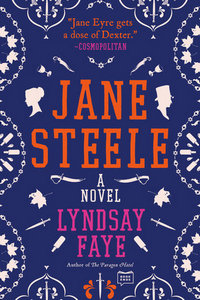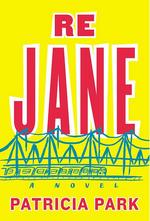 Jane Steele
Jane Steele
by Lyndsay Faye
DETAILS: Publisher: G.P. Putnam's Sons Publication Date: March 14, 2017 Format: Paperback Length: 420 Read Date: October 14-17, 2022

Few among us are aware of how much blood the human body contains—surging in thick waves should it chance to be spilt.
I had spilled it, meanwhile, and therefore drastic measures were required.
[redacted] was felled by a strangely skilful blow—as if I had studied the act, when in fact I had simply decided that he should stop being alive. He gurgled a disbelieving shriek, eyes ablaze with wrath and fear, looking perversely more alive than ever, each muscle taut with severest alarm. He even got halfway to his feet, reaching for me, rich gore soaking the fateful ledger.
Then his lips bubbled crimson, his blazing eyes hardened, and he slumped forward over the desk. His fingers, so graceful in life, twitched like the poisonous insect he was; his back ceased to shudder.
I cocked my head and gauged his condition: dead.
What’s Jane Steele About?
I got really long-winded in my first draft on this point and bored myself—if I can’t keep my interest, there’s no way I’m going to keep yours. So, because I’m a giver, I’m going appropriate the description from the Publisher’s site:
A sensitive orphan, Jane Steele suffers first at the hands of her spiteful aunt and predatory cousin, then at a grim school where she fights for her very life until escaping to London, leaving the corpses of her tormentors behind her. After years of hiding from the law while penning macabre “last confessions” of the recently hanged, Jane thrills at discovering an advertisement. Her aunt has died and her childhood home has a new master: Mr. Charles Thornfield, who seeks a governess.
Burning to know whether she is in fact the rightful heir, Jane takes the position incognito and learns that Highgate House is full of marvelously strange new residents—the fascinating but caustic Mr. Thornfield, an army doctor returned from the Sikh Wars, and the gracious Sikh butler Mr. Sardar Singh, whose history with Mr. Thornfield appears far deeper and darker than they pretend. As Jane catches ominous glimpses of the pair’s violent history and falls in love with the gruffly tragic Mr. Thornfield, she faces a terrible dilemma: Can she possess him—body, soul, and secrets—without revealing her own murderous past?
The Jane Eyre of it All
There are a couple of ways to talk about Charlotte Brontë’s work relating to this book. First, the novel is Jane Steele’s favorite novel. She makes frequent mention of it, plot points, and even when she buys a new copy. Jane is very aware of how events in her life parallel Eyre’s, and while the two women share responses to some things—ultimately, they’re very different people.
But my primary focus is from the perspective of the reader. The book was marketed as “what if Jane Eyre was a serial killer?” and “Jane Eyre + Dexter.” And that’s not wrong, but I think it’s more than that. Another way to put it is that this isn’t in the same vein as Pride and Prejudice and Zombies. The account of Steele’s life—broadly viewed—does follow the same outline as Eyre’s (the question can, and should, be asked how much of this is real and how much is a projection by the narrator). Also, I’m not crazy about the serial killer tag. She’s a vigilante who has killed enough to get the label “serial.” But it’s not ever presented as something she’s driven to do from within (although that might be a coverup by the first-person narrator).
But basically, it’s the same rough outline, with a lot of significant differences. The Flight of Gemma Hardy and Re Jane are closer re-tellings of Jane Eyre.
So, what did I think about Jane Steele?
In the end, not only is it a strange little love story and a little bit of a thriller, but there’s some reflection on humans as storytelling creatures. Not just in the stories we set down—Jane Eyre and Jane Steele for example—but the stories we tell ourselves and each other. There’s an essay to be written there by a more insightful blogger than I.
Faye did a good job of making most/many of the characters have Twenty-First Century sensibilities while walking around Nineteenth-Century London. Some authors can’t pull it off, but Faye did. The pacing is quick. The writing is crisp and clever, and there’s a humor to this that you might not expect (but is really the only way this is palatable)—after distancing the work from Dexter earlier, the humor of the novel really does match the Showtime version at its best. I wouldn’t change a thing about any of the characters, and really do regret that the nature of this story pretty much eliminates a sequel, because I’d like to revisit them (but a sequel would really be a bad idea).
I came for the Jane Eyre aspect, got hooked by the characters, and stayed for Faye’s prose and story. This ended up as far better than I expected and pretty different than what I thought I was getting into. I was glad to see it (don’t get me wrong, the Eyre stuff is great, but it’s just the icing on this tasty cake) and heartily recommend this to you.

This post contains an affiliate link. If you purchase from it, I will get a small commission at no additional cost to you. As always, the opinions expressed are my own.
![]()




 There are two ways to look at this book — as a retelling of Jane Eyre and as a novel on its own terms. It’s clearly indebted to Jane Eyre — frequently, the allusions are subtle; sometimes, she might as well be jumping up and down waving a flag. Still, Park’s her own writer — this is its own story, with its own characters — and a heroine who’s not just Brontë’s best-known character thinly disguised.
There are two ways to look at this book — as a retelling of Jane Eyre and as a novel on its own terms. It’s clearly indebted to Jane Eyre — frequently, the allusions are subtle; sometimes, she might as well be jumping up and down waving a flag. Still, Park’s her own writer — this is its own story, with its own characters — and a heroine who’s not just Brontë’s best-known character thinly disguised.